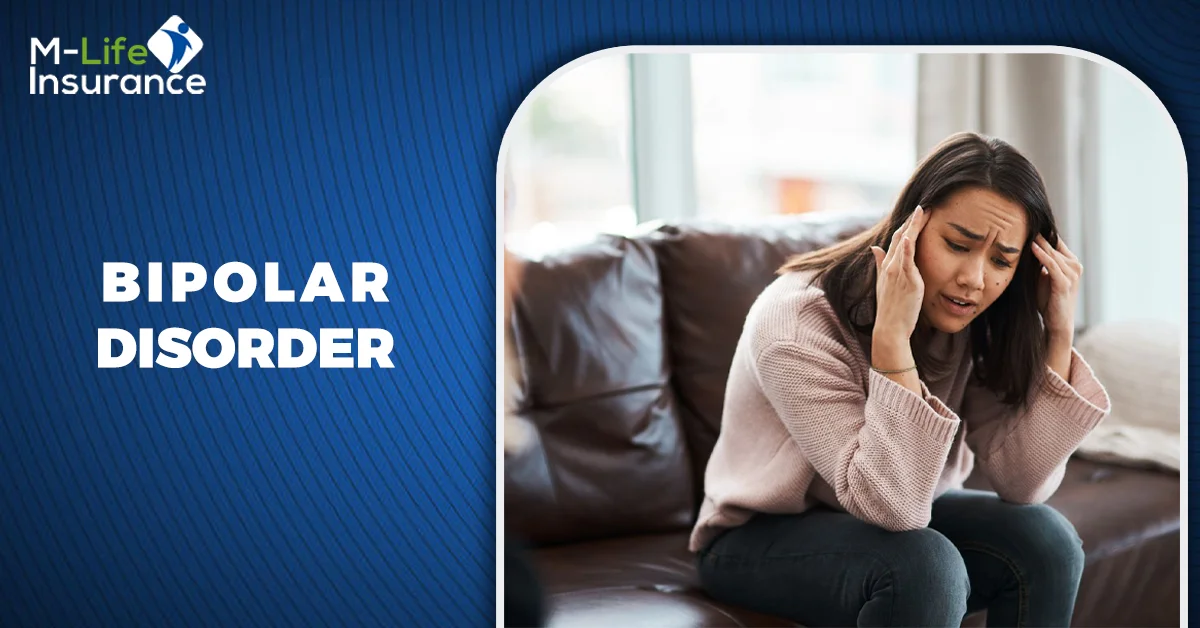Do you have any mental health history like bipolar disorder and you are seeking a life insurance plan? Well! Having any kind of mental health history can’t disqualify you from getting life insurance. You can easily find bipolar life insurance while searching for insurance policies.
Table of Contents
ToggleFinding a reasonable, standard underwritten life insurance policy for bipolar people can be a daunting task, but not impossible. If someone has a mild and controlled bipolar disorder, he can qualify for a traditional insurance plan even with a standard rate. However, if the disorder is severe, the plan you may get and premiums vary.
In this blog post, we will explore various life insurance for bipolar patients. But before that, we will understand what bipolar disorder is, its effects, is it a pre-existing condition, and other aspects of this disorder. Let’s get started!
What is Bipolar Disorder?
Bipolar disorder previously known as “manic depression” is a mood disaster due to an imbalance of neurotransmitters in the brain. It generally manifests as severe mood swings that can last from days to even months. People diagnosed with bipolar experience extreme highs in manic episodes and extreme lows like depression.
This disorder can be triggered by:
- Stress
- Genetics
- Drug or alcohol use
- Physical abuse
- Illness or injury
- Hormone imbalances
- Environmental factors
What are the effects of bipolar disorder on human health?
Bipolar disorder can have severe impacts on the suspected person’s life. It can cause irritability, hopelessness, aggressiveness, severe sadness, overactivity, forgetfulness, and many other such feelings. However, it’s a treatable condition. By combining psychiatric medication, therapy, and support networks, it’s quite easy to manage the medical condition of the people having this disorder.
Is bipolar disorder considered a pre-existing condition for life insurance?
Yes! Many life insurance companies consider bipolar disorder to be a pre-existing condition. Because a lot of health and lifestyle risks are associated with this disorder insurance companies have to be concerned. Some symptoms including drug use, suicidal thoughts or attempting suicide, extra money spending, or gambling distress the insurance providers. Most often, suicide invalids a life insurance plan.
However, everyone suffering from bipolar has a different journey as not every case is so extreme. However, bipolar disorder statistics are viewed as being very risky by insurance companies. Such as 83% of bipolar disorders are termed as severe and an estimated 25 to 50% patients of with bipolar have attempted suicide at least once in their lifetime. Additionally, 60% of people with mental health problems including bipolar develop substance abuse issues.
Consequently, these statistics prove that people suffering from bipolar issues are not always safe to get insured. That’s why bipolar disorder is considered a pre-existing condition and can cause an increase in your policy’s rates or may get your application denied.
Best Life Insurance for Bipolar Disorder
When you have to buy a life insurance plan, the insurer will require all the medical information and history about you to assess the risk during a process called underwriting. Through this process, the insured will be assigned to a particular rating class.
If the bipolar patient is placed in the preferred or preferred plus category, he will get the lowest life insurance premiums. However, those who fall into the standard category will get the average or base rates.
While those who are not in good health or may have a pre-existing condition will fall into a substandard category. That means they will receive the highest rates for their insurance plan. If your disorder is very mild, with no other health concerns or medication history, you will be placed into the standard rating class.
But how do you know if your bipolar disorder is mild and under control? When you follow your doctor’s prescription properly, have no changes in your medications, not abusing drugs, and haven’t attempted to commit suicide, most insurers will take your symptoms to be at lower risk.
What are the bipolar life insurance plan options for people with bipolar disorder?
Now let’s discuss some life insurance policy options available to people with bipolar disorder. But before doing that, we should separate the diagnosis of bipolar 1 from bipolar 2, the most common type of bipolar disorder.
How Much Does Life Isurance Cost?
The diagnosis of bipolar 1 is more severe than the diagnosis of bipolar 2. Not just diagnosis, its symptoms are even more extreme. According to the National Institute of Mental Health, manic episodes with bipolar 1 last for at least seven days but can be longer than these. Moreover, its symptoms are debilitating, sometimes to the extent that the suspect is unable to work normally.
On the other hand, the symptoms of bipolar may include only patterns of manic symptoms, not full episodes. So it’s a good sign if your insurer charges differently for bipolar 1 vs. bipolar 2. It proves that the company knows about the severity or the lack of severity of your condition.
In case your bipolar disorder is mild and under control for at least three years, you will easily get a traditional underwritten life insurance plan at standard rates. Otherwise, you can consider buying a graded death benefit. For severe bipolar, you can also go for a guaranteed issue plan with no medical questions or exams.
The Bottom Line
If you have bipolar disorder, you can still get bipolar life insurance. The available type of life insurance depends on your situation. However, you may have the option of purchasing a fully underwritten plan and guaranteed issue life insurance. Additionally, you can also consult a professional advisor to seek some guidance about available bipolar life insurance options.
Frequently Asked Questions (FAQs)
1- What are the options available for bipolar life insurance?
With bipolar disorder you can get a standard insurance plan, a simplified issue plan with a smaller death benefit, guaranteed issue life insurance, and “almost” guaranteed issue life insurance.
2- What is considered a mental health condition for bipolar life insurance?
Although the mental health conditions considered by insurers vary from carrier to carrier. However, if you have been diagnosed with any below-given mental health conditions, it will impact your premiums as well as your ability to get a life insurance plan.
- Depression
- Anxiety disorders
- Bipolar disorder
- ADHD (Attention Deficit Hyperactivity Disorder)
- Dissociative disorders
- OCD (Obsessive-Compulsive Disorder)
- Eating disorders
- Psychosis
- Schizophrenia
- PTSD (Post-traumatic Stress Disorder)
- Schizoaffective disorder
3- Can you get life insurance if you are bipolar?
Yes, you can still get a bipolar life insurance plan even if you have mental health issues. The type of condition, the severity, how long ago it was diagnosed, and other factors will decide your qualification for and cost of a life insurance plan.


